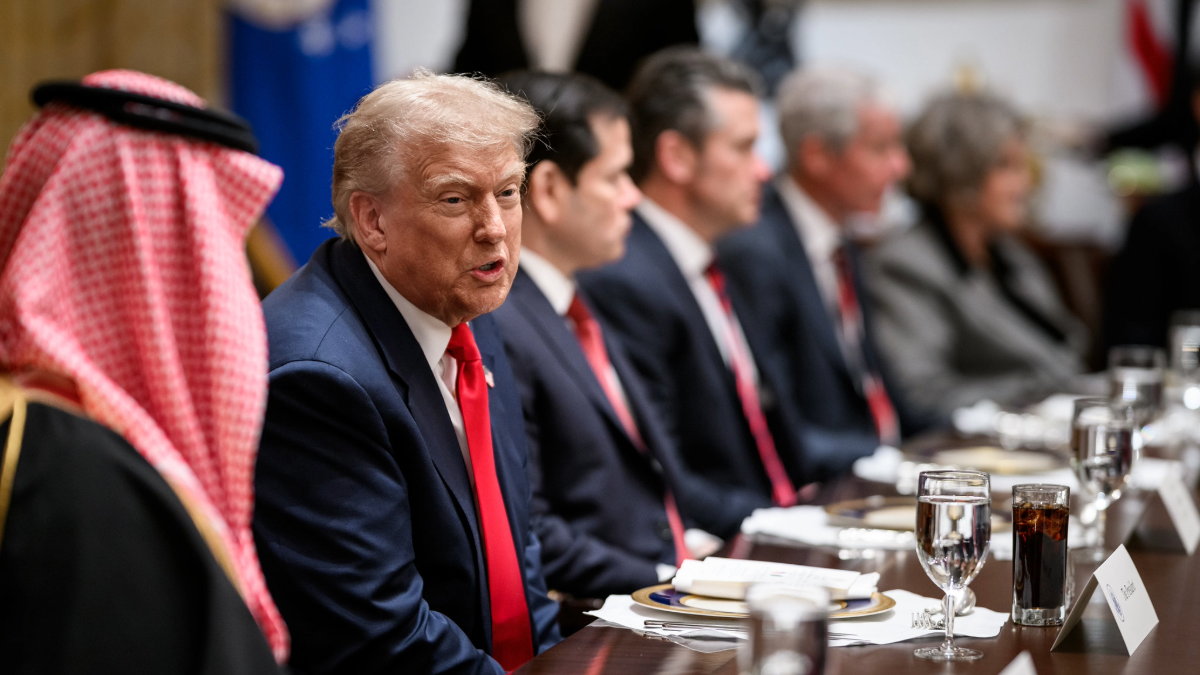White House Circulates Draft Executive Order Targeting State AI Laws
Justin Hendrix / Nov 20, 2025
President Donald Trump participates in a bilateral lunch meeting with Crown Prince and Prime Minister Mohammed bin Salman Al Saud of Saudi Arabia, Tuesday, November 18, 2025, in the Cabinet Room. (Official White House photo by Daniel Torok)
On Tuesday, United States President Donald Trump posted to Truth Social that “Investment in AI is helping to make the U.S. Economy the 'HOTTEST' in the World — But overregulation by the States is threatening to undermine this Growth Engine.” On Wednesday, the Trump administration circulated a six-page draft executive order titled “Eliminating State Law Obstruction of National AI Policy.”
Like other artifacts of the administration’s AI policy, the draft order is framed as a necessity to secure American “economic security and dominance across many domains.” And like other Trump administration executive orders, it is as much a political screed as a policy document.
The draft repeats an assertion popular with industry boosters—that “State legislatures have introduced over 1,000 AI bills that threaten to undermine” innovation—and takes issue, specifically, with recent laws passed in California and Colorado. It says such laws are the work of “sophisticated proponents of a fear-based regulatory capture strategy” that are creating “a patchwork regulatory framework that forces compliance with the lowest common denominator and allows the most restrictive states to dictate national Al policy at the expense of America's domination of this new frontier.”
Dominance, it says, will be delivered “through a minimally burdensome, uniform national policy framework for AI.” Delivering that policy framework, the draft order says, should fall to agencies including the Department of Justice, the Department of Commerce, the Federal Communications Commission, the Federal Trade Commission, and the President’s Special Advisor for AI and Crypto, working in concert with various other parts of the executive branch that are concerned with AI policy.
- Department of Justice: The draft order calls on the Attorney General to create an “AI Litigation Task Force” to challenge state AI laws “including on grounds such laws unconstitutionally regulate interstate commerce, are preempted by existing Federal regulations, or are otherwise unlawful in the Attorney General's judgment.” (On the Substack Transformer, Shakheel Hashim points to a resemblance between this idea and a policy document recently produced by Andreessen Horowitz on how the Commerce Clause could be used to set “guardrails” for state AI laws.)
- Department of Commerce: The draft order calls on the Secretary of Commerce to work with other White House officials to develop a hit list of state laws “that conflict” with the pursuit of AI supremacy. Of particular concern are laws that “require AI models to alter their truthful outputs” and those that require disclosures by AI companies that “would violate the First Amendment or any other provision of the Constitution.” Borrowing an idea from a version of the moratorium on state AI laws debated in Congress during the summer, the draft order also calls on the Secretary of Commerce to issue a policy notice tying the deployment of Broadband Equity Access and Deployment (BEAD) program funds to an evaluation of the “regulatory landscape” in states. The order calls on other agencies to do similar evaluations of their discretionary grant programs.
- Federal Communications Commission: The draft order calls on the FCC Chair to “initiate a proceeding to determine whether “to adopt a Federal reporting and disclosure standard for AI models that preempts conflicting State laws.
- Federal Trade Commission: The FTC Chair is required to issue a policy statement to “explain the circumstances under which State laws that require alterations to the truthful outputs of AI models are preempted by the FTC Act's prohibition on engaging in deceptive acts or practices affecting commerce.” This language is congruent with Trump's previous executive order, titled “Preventing Woke AI in the Federal Government,” which seeks to advance "unbiased AI."
- Special Advisor for AI and Crypto: The special advisor, a position held by former tech entrepreneur and investor David Sacks, is directed to develop “a legislative recommendation establishing a uniform Federal regulatory framework for AI that preempts State AI laws” that are inconsistent with the policy set forth in the draft order.
What details will be in any eventual executive order remains to be seen. A White House spokesperson told Politico that “discussion about potential executive orders is speculation."
But late Wednesday, various civil society organizations issued statements critical of the draft order. Alejandra Montoya-Boyer, vice president of The Leadership Conference’s Center for Civil Rights and Technology, said the purpose of the draft order is “giving the administration’s tech billionaire buddies and corporations a free pass rather than protecting the people it's meant to serve.” Travis Hall, director for state engagement for the Center for Democracy and Technology, said “The President cannot preempt state laws through an executive order, full stop.”
Even as the Trump administration gauges reaction to its draft order, Congress appears ready for another potential showdown over a proposed moratorium on state AI laws. House Republicans are considering using the National Defense Authorization Act (NDAA) to pass the moratorium, which failed during budget negotiations earlier this year.
Trump started the week by hosting Saudia Arabia's Crown Prince and Prime Minister, Mohammed bin Salman Al Saud, at the White House. A dinner celebrating his visit was attended by various tech executives, including Apple's Tim Cook, Nvidia's Jensen Huang, and billionaire entrepreneur and former Trump official Elon Musk. Musk and Huang were among those who attended a US-Saudi Investment Forum on Wednesday, where Trump's remarks underscored how closely his economic agenda is tied to the AI investment boom.
“We will work closely with friends and partners like those in this room to build the largest, most powerful, most innovative AI ecosystem in the world,” Trump told the forum's attendees.
Authors
